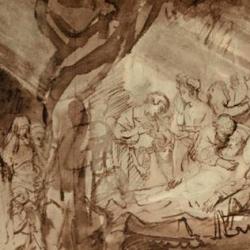Today?s sermon is about raising priests and kings, and a few of the things I say in the sermon today refer to touch. I?m going to encourage you all to hold and caress and cuddle with your infants, and I?m going to encourage you to hug and kiss your older children as well. Since this doesn?t come naturally to many of us ?Eespecially those of us who were raised as Midwestern Lutherans ?EI wanted to go into more depth in showing the biblical teaching on this.
The basic theological point is to emphasize that we have bodies, and that we are made to express affection and love with our bodies. This is seen most clearly in marital sex, but it is apparent in all kinds of other ways as well. Just as honor has to take a concrete, sensible form if it is going to be honor at all, so also love and affection have to take concrete, sensible forms if it is going to be love at all. ?I love him will all my heart, but I never tell him and never actually do anything to express my love?E?Ethat is an impossible, or rather, an ungodly statement.
Touch is obviously one of the most intimate of senses. We can hear something from a great distance, from the right vantage point we can see for hundreds of miles, and we can smell a farm long before we can see it. To taste something we normally have to bite into it, but taste is so closely connected to smell that we can nearly taste bread baking at Zume when we?re walking down the other side of Main Street. We can only touch someone else, however, if we?re physically close, and for that reason, touch expresses the intimacy of love in a uniquely direct manner. In the film Wit , Emma Thompson plays a literature scholar who is dying of cancer. One of the most moving things about the film is that throughout her suffering no one touches her ?Euntil she is all but dead anyway.
The Bible has a surprising amount to say about touch. In the OT, many of the passages have to do with warnings NOT to touch certain things. From the command not to eat from the tree of knowledge, Eve deduced that she was not to touch it either (Gen 3:3). A barrier was put up at Sinai so that no one would touch the mountain where Yahweh appeared in glory, and anyone who did touch the mountain was to be put to death (Ex 19:13). Throughout Leviticus, Israel is warned not to touch unclean things ?Ecarcasses of animals, a bed on which a menstruating woman sits, a corpse.
There are occasions of healing and saving touch in the OT. When Daniel sees distressing visions of the future of Israel, he falls down ?in a deep sleep with my face to the ground?Ebut then the angel ?touched me and made me stand in my standing?E(Dan 8:18). Later, he sees another distressing vision, but a touch from an angel brings him first to his hands and knees (10:10) and then strengthens him (10:18). When Yahweh touches the mouths of Isaiah and Jeremiah and Daniel, he puts His word there so they can declare it to the people (Is 6:7; Jer 1:9; Dan 10:16)
Much is different in the NT. While holy objects could not be touched under the OT system, in the NT the Holy One Himself comes in human flesh, the glory of God tabernacles in the flesh, and, as John says, the apostles not only saw and heard Him, but ?touched?EHoliness incarnate (1 Jn 1:1). Most of the references to touching in the NT have to do with Jesus, and He touches people and is touched constantly. A woman with a flow of blood hopes that she will be healed if she touches the hem of Jesus?Egarment, and the multitudes crowd around to touch him. Two blind men on the road to Jericho cry out for healing, and Jesus touches their eyes and heals them. Peter?s mother-in-law is sick with a fever, and Jesus touches her hand and the fever leaves. When Jesus touches the coffin of the corpse of the young man of Nain, instead of becoming unclean he raises the man from the dead. And when he touches lepers, the lepers are cleansed. The same things happens in Acts, when a touch from a napkin from the disciples brings healing.
Of course, our touch does not perform the miracles that the finger of Jesus did, but these biblical examples show that God uses touch to bring healing and restoration and joy. Of course, too, precisely because touch expresses intimacy and closeness, we aren?t to go around touching everyone all the time. But Scripture encourages us to express our affection and love for one another, and especially for members of our family, by touching them.











